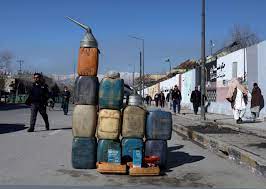
The Taliban have inked a provisional deal with Russia to supply gasoline, diesel, gas and wheat to Afghanistan, Acting Afghan Commerce and Industry Minister Haji Nooruddin Azizi told Reuters.
Azizi said his ministry was working to diversify its trading mates and that Russia had offered the Taliban administration a reduction to average global commodity prices.The move, the first known major transnational profitable deal struck by the Taliban since they returned to power more than a time ago, could help to ease the Islamist movement’s insulation that has effectively cut it off from the global banking system.
No country formally recognises the group, which fought a 20- time insurrection against Western forces and their original Afghan abettors before sweeping into Kabul asU.S. colors withdrew.Western diplomats have said the group needs to change its course on mortal rights, particularly those of women, and prove it has cut ties with transnational militant groups in order to gain formal recognition.
Russia doesn’t officially honor the Taliban’s government, but Moscow hosted leaders of the movement in the run- up to the fall of Kabul and its delegacy is one of only a sprinkle to remain open in the Afghan capital.
Azizi said the deal would involve Russia supplying around one million tonnes of gasoline, one million tonnes of diesel,,000 tonnes of thawed petroleum gas( LPG) and two million tonnes of wheat annually.On Wednesday, Russia’s state- possessed TASS news agency quoted Moscow’s special representative for Afghanistan, Zamir Kabulov, as attesting that” primary agreements” had been reached on energy and food inventories to Kabul.
Russia’s energy and husbandry ministries didn’t incontinently respond to requests for comment on the agreement. The office of Russian Deputy Prime Minister Alexander Novak, who’s in charge of oil painting and gas, also didn’t incontinently respond.
Azizi said the agreement would run for an unidentified trial period, after which both sides were anticipated to subscribe a longer term deal if they were happy with the arrangement.
He declined to give details on pricing or payment styles, but said Russia had agreed to a reduction to global requests on goods that would be delivered to Afghanistan by road and rail.
The deal was finalised after an Afghan specialized platoon spent several weeks in conversations in Moscow, having stayed on after Azizi visited there last month.
Since the Taliban recaptured power, Afghanistan has been plunged into profitable extremity after development aid upon which the country reckoned was cut and amid warrants that have largely firmed the banking sector.
The trade deal is likely to be watched nearly in the United States, whose officers have held regular addresses with the Taliban on plans for the country’s banking system.
Washington has blazoned the creation of a Swiss trust fund for some of the Afghan central bank reserves held in the United States. The Taliban have demanded the release of the entire quantum of around$ 7 billion and said the finances should be used for central bank operations.
Azizi said transnational data showed most Afghans were living below the poverty line, and his office was working to support trade and the frugality through transnational outreach.Afghans are in great need,” he said.” Whatever we do, we do it grounded on public interest and the people’s benefit.”
He said Afghanistan also entered some gas and oil painting from Iran and Turkmenistan and had strong trade ties with Pakistan, but also wanted to diversify.
A country. should not be dependent on just one country, we should have indispensable ways,” he said.The Group of Seven( G7) nations are trying to find ways to limit Russia’s oil painting import earnings in the wake of its irruption of Ukraine in February.
Moscow has managed to maintain earnings through increased crude deals to Asia, particularly China and India. The European Union will ban Russian crude significances byDec. 5 and Russian oil painting products byFeb. 5.

